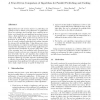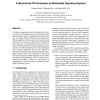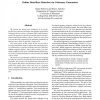OSDI
1996
ACM
15 years 3 months ago
1996
ACM
High-performance I/O systems depend on prefetching and caching in order to deliver good performance to applications. These two techniques have generally been considered in isolati...
101
click to vote
OSDI
1996
ACM
15 years 3 months ago
1996
ACM
Non-blocking synchronization has significant advantages over blocking synchronization: however, it has not been used to a significant degree in practice. We designed and implement...
101
click to vote
OSDI
1996
ACM
15 years 3 months ago
1996
ACM
The need for supportingvarietyof hard and soft real-time, as well as best effort applications ina multimedia computing environment requires an operating system framework that: (1)...
113
click to vote
OSDI
1996
ACM
15 years 3 months ago
1996
ACM
Today's extensible operating systems allow applications to modify kernel behavior by providing mechanisms for application code to run in the kernel address space. The advanta...
133
click to vote
OSDI
1996
ACM
15 years 3 months ago
1996
ACM
Traditional processor scheduling mechanisms in operating systems are fairly rigid, often supportingonly one fixed scheduling policy, or, at most, a few "scheduling classes&qu...
138
click to vote
OSDI
1996
ACM
15 years 3 months ago
1996
ACM
This paper describes a novel approach to providingmodular and extensible operating system functionality and encapsulated environments based on a synthesis of microkernel and virtu...
OSDI
1996
ACM
15 years 3 months ago
1996
ACM
The explosive growth of the Internet, the widespread use of WWW-related applications, and the increased reliance on client-server architectures places interesting new demands on n...
OSDI
1996
ACM
15 years 3 months ago
1996
ACM
119
click to vote
OSDI
1996
ACM
15 years 3 months ago
1996
ACM
We present the design and evaluation of an on-thefly data-race-detection technique that handles applications written for the lazy release consistent (LRC) shared memory model. We ...
131
click to vote
OSDI
1996
ACM
15 years 3 months ago
1996
ACM
This paper describes a mechanism by which an operating system kernel can determine with certainty that it is safe to execute a binary supplied by an untrusted source. The kernel r...




